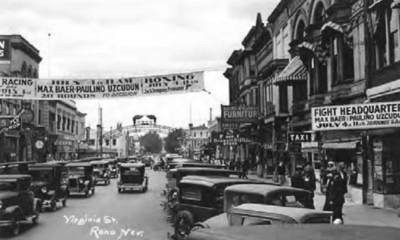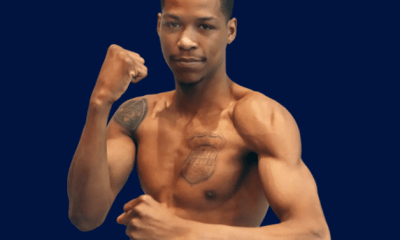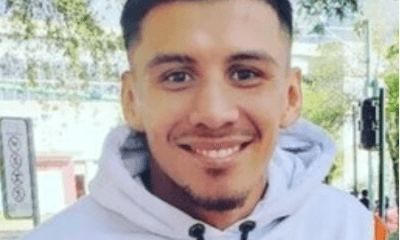Argentina
Golovkin-Jacobs: A Bigger “Drama Show” Than Expected
GOLOVKIN-JACOBS — On March 18, Gennady Golovkin and Danny Jacobs met in the ring at Madison Square Garden in a middleweight title-unification bout. It was supposed to be an orderly coronation for Golovkin. But fights are unscripted, and this one unfolded in defiance of expectations.
Outside the ring, Golovkin is one of the least-imposing elite fighters imaginable. His face is largely unmarked. His body language is laid-back. He looks like a computer geek with a quiet placid demeanor. He turned pro after winning a silver medal on behalf of Kazakhstan as a middleweight at the 2004 Athens Olympics, compiled a 36-0 (33 KOs) professional record, and claimed the WBC, WBA, IBF, and IBO 160-pound titles.
In the minds of many, the only thing standing between Golovkin and greatness was the absence of elite opponents on his record. Sergio Martinez, Miguel Cotto, and Canelo Alvarez all steered clear of him when they held one version or another of the middleweight crown.
Whoever Golovkin fights – tall guys, short guys, finesse boxers, big punchers – Gennady says, “No problem.” He delights in giving fans what he calls “big drama show” and came into Madison Square Garden to fight Jacobs riding a string of 23 consecutive knockouts.
Jacobs entered the bout with a 32-1 (29 KOs) ledger and was the “regular” (or phony) WBA middleweight champion. He’s a good fighter whose career as a boxer has been defined more by his ring failures than his ring triumphs.
Now 29, Jacobs was a much-decorated amateur, amassing a 137-and-7 record. But he lost twice unexpectedly to Shawn Estrada in the 165-pound division at the trials for the 2008 Beijing Olympics. The first time he was matched tough as a pro (against Dmitry Pirog in 2010), Danny crumbled and was knocked out in the fifth round.
But those losses were overshadowed by Jacobs’s inspirational return from being stricken with cancer to fight again at a world-class level. That chapter of Danny’s life began in 2011, when he felt numbness in his legs and began having difficulty walking. The diagnosis was osteosarcoma: a life-threatening form of bone cancer that had wrapped a tumor around his spine.
Jacobs underwent surgery and returned to the ring after a 19-month layoff. For the rest of his life, he’ll have titanium rods in his back. It’s difficult to overstate the magnitude of his accomplishments and courage.
There was mutual respect between the fighters in the build-up to Golovkin-Jacobs.
“He’s a very good guy,” Golovkin said of his opponent. “I’ve watched a couple of his fights. He looks good. He looks strong. And he looks very focused. I think he is the best that I have been up against in my career. I’m very excited to fight Daniel Jacobs. He is world-class and will be a big test for me.”
Jacobs responded in kind, saying, “I’m a fan of the sport. I like to watch Triple-G too. I’ve watched him his whole career. He’s a great fighter. He has power. He cuts the ring off well. His jab is good. He’s not the hardest guy in the world to hit, but he takes a good punch. I’m honored to share the ring with him.”
In boxing, one win or one loss can dramatically alter the trajectory of a fighter’s career.
Golovkin-Jacobs represented a huge opportunity for Jacobs. Everything was aligned for him to become a star if he beat Golovkin. With that in mind, Danny declared, “I want to go and tackle greatness. I want to go into Madison Square Garden and see my family and see my friends and see everybody there for me. I’m really just waiting for that moment. I’m ready for my fans to be in my corner and everyone standing up and cheering when that first bell rings. It’s a big opportunity for me, and I’m looking forward to it. Winning this fight will take everything to the next level.”
But many insiders didn’t just label Jacobs an underdog. They were saying that he had virtually no chance. From the day the fight was announced until fight night, Jacobs had to smile through people wishing him luck at the same time they were thinking, “Poor Danny. He has no idea what Gennady will do to him.”
Golovkin’s most notable wins had been against Kell Brook, David Lemieux, Martin Murray, Curtis Stevens, and Matthew Macklin. That’s not Marvin Hagler and Carlos Monzon, but it’s better than the best that Jacobs could offer (Peter Quillin and Sergio Mora).
Also, there were questions about Jacobs’s ability to take a punch, largely because of his loss to Pirog.
“I’m a far better fighter now than I was then,” Jacobs said of that defeat. “I’m stronger. I’m smarter. I’m a complete one-eighty from the fighter I was then. Mentally, physically, all across the board in any way you can possibly grow, I’ve grown from that fight. This whole question about my chin; I’m not saying it’s absurd, but it’s a little far-fetched.”
However, Abel Sanchez (who has trained Golovkin for nineteen fights in a row) added fuel to the fire. “In forty years,” Sanchez proclaimed, “I’ve never had a fighter that hits as hard as Gennady. Jacobs is a sharp puncher with a good right hand. But he won’t go twelve rounds.”
Curtis Stevens and David Lemieux had each been knocked out by Golovkin at Madison Square Garden. Asked what advice he might have for Jacobs, Stevens was marginally encouraging, saying, “Danny’s an excellent boxer. He can win as long as he stays away, but it’s hard to stay away for twelve rounds. We’ve gotta see if his chin holds up. I’m not trying to be mean and I’m not taking anything away from him. But we all know his chin is a little suspect.”
Lemieux was less sanguine. “I have no advice for him,” David responded. “He can do what he wants. I don’t think he’s gonna win.”
Still . . . There’s a long list of fighters who’ve said in the past that they wanted to fight Golovkin but didn’t. Canelo Alvarez heads the roster of those who’ve talked the talk but disappeared when given the opportunity to walk the walk. Unlike Canelo, Jacobs genuinely wanted to fight Golovkin. And he was looking forward to the encounter as his coming out party.
“I know this guy has a reputation,” Jacobs said. “He’s the number one guy at the moment. I can’t deny that. You have to give respect where respect is due. But I think I’m the better fighter. I’m bigger; I’m faster. I have power and a good boxing IQ. Whatever he does, I’ll be ready for it. Just because he has A+ or A- power and I have B+ or B- power doesn’t mean both guys can’t go down or both guys can’t get hurt. I have to be careful, but so does he. I know what I’m capable of. I know what I’m good at. It’s all about putting it in sync on fight night. So many people are doubting me. There’s nothing better than fulfilling your dreams and proving all the doubters wrong in the same night.”
Madison Square Garden was buzzing on fight night with an announced crowd of 19,939. Depending on where one looked, Golovkin was a roughly 6-to-1 betting favorite and 4-to-1 to win by knockout. Gennady is so efficient and methodical in the ring that people tend to forget his fights are unfolding in real time; that he’s flesh and blood, not a machine, and that anything can happen in a prize fight.
Both men fought cautiously at the start. Golovkin was stalking but not as aggressively as has been his custom in recent fights. Jacobs was content to box from the outside.
In round three, Golovkin began to close the gap and dictate the distance between Jacobs and himself. That paid dividends in round four when Gennady caught Danny against the ropes and landed a jab followed by a straight right hand that put Jacobs on the canvas.
At that point, the assumption among most observers was, “Okay; here we go. The fight is over.”
Not . . .
In round five, counterintuitively, Jacobs began fighting effectively as a southpaw, which he did thereafter for long stretches of time. That seemed to slow Golovkin. Then Danny started letting his hands go a bit more.
Golovkin was never able to find his rhythm. He never put punches together in a way that landed more than one effective blow at a time. For much of the night, he looked ordinary. Other times, he looked old.
In round nine, Jacobs appeared to tire a bit. He got sloppy and overreached on several punches, enabling Golovkin to tag him with a solid right uppercut. But otherwise, Gennady failed to capitalize on the few mistakes that Danny made.
The fight seemed to be up for grabs in the final two rounds. The crowd sensed an upset. But it wasn’t to be. The decision could have gone either way, and the judges ruled in Golovkin’s favor by a 115-112, 115-112, 114-113 margin.
Writing for The Independent, Steve Bunce put the night in perspective when he declared, “It is far too simple to dismiss the odd performance of Gennady Golovkin on Saturday night as the start of the end for the fighting maestro. But that is exactly what it looked like at times. Golovkin looked weary, lacked precision, and was too predictable. After nearly 400 amateur fights and 36 in the paid ranks, he might just be, at 34 and after a life devoted to boxing, getting old.”
Then, referencing round four when Golovkin knocked Jacobs down, Bunce added, “Golovkin was expected to finish the fight then, provide his ‘big drama show,’ and end the night for Jacobs. But there was no Golovkin finish. And that was odd for a man who has ruined so many fighters and has never allowed a hurt fighter the time to survive.”
Gennady Golovkin is still a very good fighter. But the aura of invincibility that enveloped him is now gone.
Check out more boxing news on video at The Boxing Channel.
Thomas Hauser can be reached by email at thauser@rcn.com. His most recent book – A Hard World: An Inside Look at Another Year in Boxing – was published by the University of Arkansas Press. In 2004, the Boxing Writers Association of America honored Hauser with the Nat Fleischer Award for career excellence in boxing journalism.
-

 Featured Articles3 weeks ago
Featured Articles3 weeks agoAvila Perspective, Chap. 330: Matchroom in New York plus the Latest on Canelo-Crawford
-

 Featured Articles2 weeks ago
Featured Articles2 weeks agoVito Mielnicki Jr Whitewashes Kamil Gardzielik Before the Home Folks in Newark
-

 Featured Articles4 weeks ago
Featured Articles4 weeks agoOpetaia and Nakatani Crush Overmatched Foes, Capping Off a Wild Boxing Weekend
-

 Featured Articles3 weeks ago
Featured Articles3 weeks agoCatching Up with Clay Moyle Who Talks About His Massive Collection of Boxing Books
-

 Featured Articles4 weeks ago
Featured Articles4 weeks agoFabio Wardley Comes from Behind to KO Justis Huni
-

 Featured Articles2 weeks ago
Featured Articles2 weeks agoMore Medals for Hawaii’s Patricio Family at the USA Boxing Summer Festival
-

 Featured Articles3 weeks ago
Featured Articles3 weeks agoThe Shafting of Blair “The Flair” Cobbs, a Familiar Thread in the Cruelest Sport
-

 Featured Articles3 weeks ago
Featured Articles3 weeks agoRichardson Hitchins Batters and Stops George Kambosos at Madison Square Garden






















